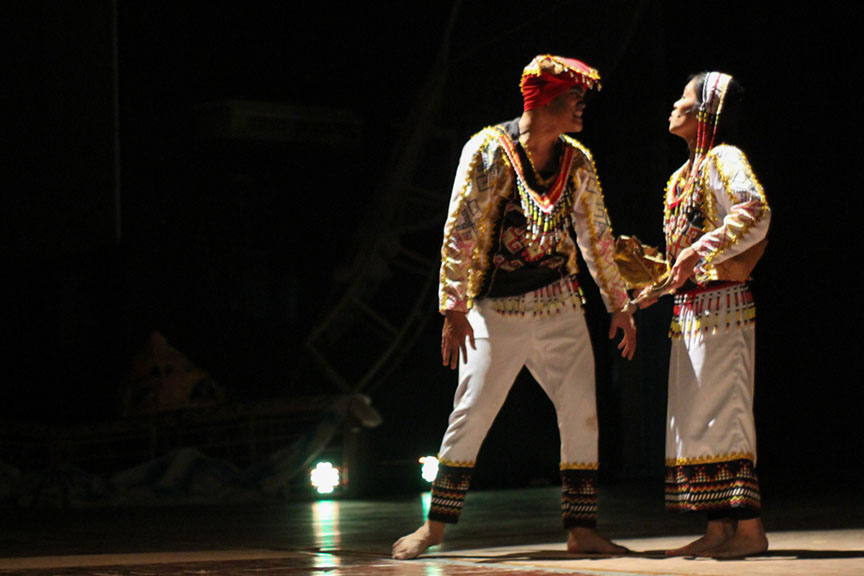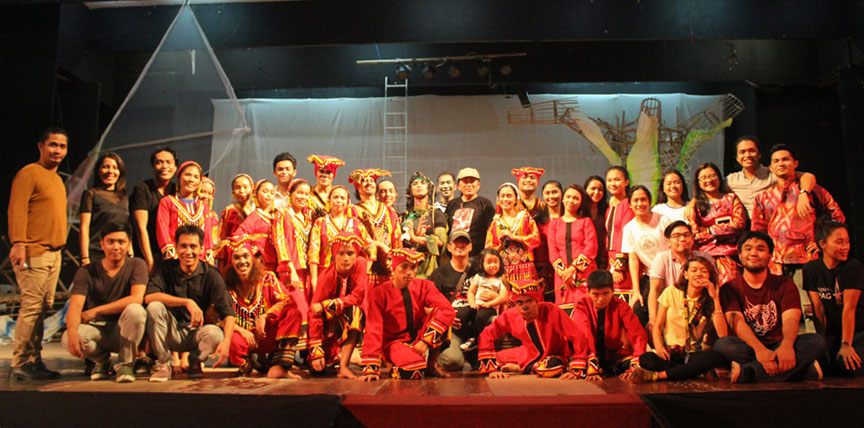ILIGAN CITY (MindaNews / 22 Nov) – The plight of the Lumad, in particular, the Agusanon Manobo, took center stage when the Mindanao State University-Iligan Institute of Technology’s (MSU-IIT) resident theatre company, the Integrated Performing Arts Guild (IPAG), mounted the play Datu Mankalasi by writer German V. Gervacio on November 20 at the institute’s gymnasium.
 German Gervacio’s “Datu Mankalasi” as performed by IPAG. Photo courtesy of IPAG
German Gervacio’s “Datu Mankalasi” as performed by IPAG. Photo courtesy of IPAG
A number of datus from the Manobo and Higaunon groups came to witness the performance preceded by a lecture on the Lumad groups’ experiences.
Their presence before, during and after the performance was a stamp of approval to a portrayal of their generations of struggle against the oppressor from pre-colonial to contemporary times.
The struggles of the Lumads against logging and land grabbing of ancestral lands, mining, abuse of human rights and other plaints were aired by Manobo Datus Roger Plana and Nilo Cabungcal and Higaunon Datu Joseph Paborada before a group of students, faculty members and other guests.
The organizers, Kalumbay Regional Lumad Organization, said that the plight of the Lumads often do not get any publicity from mainstream media so they hoped that their hurts might be laid bare in the social media and in performances such as IPAG’s mounting of Datu Mankalasi played by Miguel Joven Perfecto.
The IPAG was at its usual best at dialog that made use of Filipino and Binisaya, excellent light and set designs by Hermi Dico, Jan Pagarigan, Christian Jay Legaspi and Meshaq Dangel; synchronized technical management by Andrew Salazar, Karl Razul Casurra, Argiel Sasil and Mark Saura; authentic, colorful and breath-taking Manobo attire in contrast to the costumes of the Bughawan that had a smorgasbord of influences including the Manga comics, animation, the post-apocalyptic Water World and the sci-fi Final Fantasy.
Best of all, the rhythmic movements of Manobo dances were earthy and seemingly natural, thanks to the research on Manobo dances by Prosfe June de la Victoria Yee, choreography by Melvin Pascubillo, stage management by Lilibeth Maraon and production management by Arlem Abanes.
The music composed and arranged by director Steven Patrick C. Fernandez appealed to both young and old. Variations of themes from Pinkfong’s Baby Shark Dance and other MTV and Western music the millennials are familiar with were hits during the performance.
Fernandez’s compositions with assistance from Michael John Lagura marked a more upbeat and mature take on love and drinking songs.
 Cast and crew of “Datu Mankalasi.” Photo courtesy of IPAG
Cast and crew of “Datu Mankalasi.” Photo courtesy of IPAG
The beating of the drums and the sound from the synthesizer along with the thumping of feet by the Taong Aso/Taumbayan played by Gaspar Cortes Jr., John Paul Francisco, Remegio Dayanan Jr., Jack Cyril Llagas and Elias Point; and, from the Bughawan headed by Lagura, carried the whole narrative to its finish despite a few low moments where scenes needed to have flawless segues.
The veteran Lagura as the mutant Karakuda stole the show. He was too comfortable with his role to the point of portraying a bad guy as ‘fun’ eclipsing the antics of his sidekick Wariwap played by Primo Bagasol Jr. and Perfecto as Datu Mankalasi.
Mindanawons, on the other hand, hear about the plight of the Lumad of Central and Northern Mindanao, but somehow the play Datu Mankalasi, a true to life narration of the Manobo Datu and his people, if for anything, raised the Lumad struggles and their frustrations against the powerful symbolized by the Bughawin played by Kim Sumagang, Danielle Salaan, Shairah Mae de los Santos, Jonna Mai Iniego, Dency Caballero and Joy Annabelle Cimafranca.
If life is short, and art is long, this writer was skeptical about how a play with a seemingly political agenda would be handled by a writer, and transcreated by a seasoned theatre group such as the IPAG.
Poets have long been warned about not trusting those who use or abuse literature with political themes unless in an artistic, unobtrusive way which National Artists for Literature F. Sionil Jose, Cirilo F. Bautista and Bienvenido Lumbera have done with their own works.
For hundreds of years and after the artist and writer were elevated to a high status in society with the rise of the Middle Class in Europe, the artist creates beyond his times, but always cognizant of the society that nurtures his art.
If his art must live after him, his themes must go beyond the political and Gervacio did not necessarily play to the galleries.
He has woven into his narrative a more human perspective and made relevant the Higaunon lore that recounted how the Higaunons sprung from women and dogs, hence the Taong Aso or Man-Dog warriors.
Many Filipinos are not familiar with such lore and, if known, they would be put off by it because of Westernization and too engrossed in teleseryes, perhaps.
Varieties of this lore likewise exist but it is the writer or artist who makes the selection for his own purposes. Scholars later delineate between folklore and present realities, which is which, and all of its wherefores.
Therefore, it was not surprising to see a Datu Mankalasi often in a drunken stupor because unbending in his vision, and not much of a decisive leader in a folkloric sense after Campbell or Propp.
Researchers Ivy Victorio and Airen C. Sajulga may have unearthed variations of how Datu Mankalasi died but the play’s ability to show the betrayal by some of the Datu’s people (led by Datu Burdagol played by Fer Mykiel Gonzales) because material gain could alleviate their poverty and other deprivations were most plausible. One who symbolized the idealist in the play was Batikan played by Daffriel Bucayon.
Again it is to the credit of Gervacio that he portrayed women as capable leaders exemplified by Malayumi (Yvonnie Emit). In the end, and in her frustration, she returns to her roots, foreshadowed by the dialog about trees with her father Datu Mankalasi, and she, eventually reverts to her ‘aso’ or true self.
(IPAG’s Datu Mankalasi is scheduled to be performed on November 22 at the Central Mindanao University; November 24 at Xavier University; November 27 at the Bukidnon Sate University, and at the USTSP, Cagayan de Oro City on November 29.)
[The author is a poet and fictionist. She is a former IPAG Managing Director. She has recently retired as faculty of the MSU-IIT Department of English, College of Arts and Social Sciences and as Director of the Office of Publication & Information (OPI).]
